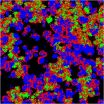(Press-News.org) Several studies have looked at possible links between maternal obesity during pregnancy and the risk of developmental disorders in the child. However, paternal obesity could be a greater risk factor than maternal obesity, according to a new study from the Norwegian Institute of Public Health.
As the first researcher to study the role of paternal obesity in autism, Dr. Pål Surén emphasises that this is still a theory and requires much more research before scientists can discuss possible causal relationships.
"We have a long way to go. We must study genetic factors in the relationship between obesity and autism, as well as environmental factors associated with switching the genes on or off - so-called epigenetic factors," he explains.
Surén and his fellow researchers used data from the Norwegian Mother and Child Cohort Study (MoBa). The researchers studied questionnaire data from over 90,000 Norwegian children at three, five and seven years of age. The mothers had answered detailed questions about their own mental and physical health, and about their children. The fathers completed a questionnaire about their mental and physical health while their partner was pregnant. The researchers also collected data from the Norwegian Patient Registry and from studies of children who were referred for evaluation and treatment of possible autism or Asperger's syndrome. By the end of the follow-up period, the children were aged 4 to 13 years.
Surprising findings
419 children, approximately 0.45 per cent of the sample, had an autism spectrum diagnosis (ASD). This is slightly lower than in the general population (0.8 per cent) because it is difficult to diagnose autism among the youngest children.
In the sample, 22 per cent of the mothers and 43 per cent of the fathers were overweight, with a body mass index (BMI) of between 25 and 30. Approximately 10 per cent of mothers and fathers were obese, with a BMI of 30 or more.
The researchers found that maternal obesity had little association with the development of autism in the child. However, they found a doubled risk for development of autism and Asperger's syndrome in the child if the father was obese, compared with a normal weight father.
"We were very surprised by these findings because we expected that maternal obesity would be the main risk factor for the development of ASD. It means that we have had too much focus on the mother and too little on the father. This probably reflects the fact that we have given greater focus to conditions in pregnancy, such as the growth environment for the foetus in the womb than both environmental and genetic factors before conception," says Surén.
The researchers adjusted for variables that may also be associated with the development of autism in the child. In addition to adjusting for maternal obesity, they considered education, age, smoking, mental disorders, hormone therapy before pregnancy, use of folic acid, maternal diabetes, pre-eclampsia and the baby's weight at birth.
Risk genes
Surén believes that the finding about paternal obesity is sound. The researchers found that the risk remained unchanged when adjusted for sociodemographic and lifestyle factors.
"Our findings therefore suggest that there may be a genetic link between obesity in the father and the development of ASD in the child," says Surén.
He points out that genetic mutation may play a role in the development of both extreme obesity and autism. Researchers have shown, for example, that if a section of chromosome 16 is missing this can lead to morbid obesity or developmental disorders in children. Mutations may be a basis for the development of a number of complex syndromes and diseases.
Another explanation may lie in epigenetics. Epigenetic changes do not mean that the gene is altered, but that the gene is activated or inactivated as a result of environmental conditions. Switching a gene on or off at the wrong time and place can lead to adverse consequences for the individual and the epigenetic changes can be passed on to the next generation.
"We still know very little about how epigenetic changes in germ cells are affected by obesity or other environmental factors but animal experiments have shown that obese males have offspring with altered gene expression in early growth regulation," says Surén.
Further research
Researchers are still in the early stages of studying possible links between obesity in the father and the development of ASD in the child. The first study is published in the May issue of Pediatrics journal. The research paper is included in Surén's doctoral thesis and it was written with a large group of researchers from university and hospital environments in Norway, England and the USA.
"We have begun to sequence all genes to find mutations and we must do more epigenetic analysis. If there is a correlation between obesity and ASD, this is a risk factor where the incidence is increasing in the population. Further research is therefore of great importance to public health," says Surén.
INFORMATION:
Reference
Suren P, et al "Parental obesity and risk of autism spectrum disorder" Pediatrics 2014; DOI: 10.1542/peds.2013-3664.
Parental obesity and autism risk in the child
2014-04-07
ELSE PRESS RELEASES FROM THIS DATE:
Fatty acid composition in blood reflects the quality of dietary carbohydrates in children
2014-04-07
Recently published research in the University of Eastern Finland found that fatty acid composition in blood is not only a biomarker for the quality of dietary fat but also reflects the quality of dietary carbohydrates. For example the proportion of oleic acid was higher among children who consumed a lot of candy and little high-fibre grain products. Earlier studies on the topic have mainly concentrated on the association of the quality of dietary fat with fatty acid composition in blood. In the present study, the association of the quality of dietary carbohydrates with ...
Why do we get allergies? The science of springtime sniffling and sneezing (video)
2014-04-07
WASHINGTON, April 7, 2014 — Spring has sprung, and with it comes blooming flowers, shorts and t-shirts and, for the millions who suffer from allergies, a runny nose, puffy eyes and general misery. In the American Chemical Society's (ACS') latest Reactions video, we explain the science behind the allergies that spoil spring for so many people. The video is available at http://youtu.be/vFZlxQU0Pyk.
INFORMATION:
Subscribe to the series at Reactions YouTube, and follow us on Twitter @ACSreactions to be the first to see our latest videos.
The American Chemical Society ...
Health benefits of 'green exercise' for kids shown in new study
2014-04-07
Children who are exposed to scenes of nature while exercising are more likely to experience health-enhancing effects after activity, according to a Coventry University study published this week in the International Journal of Environmental Research and Public Health.
Sports science academics in the University's Department of Applied Sciences and Health asked kids aged 9-10 years to complete a series of 15 minute moderate intensity cycling activities – one whilst viewing a video of a forest track synced to the exercise bike and another with no visual stimulus.
The researchers ...
Energizing sick mitochondria with vitamin B3
2014-04-07
Vitamins B have recently been turned out to be potent modifiers of energy metabolism, especially the function of mitochondria.
Vitamin B3, (niacin) has been found to delay the signs of aging in animal models.
An international collaboration between the University of Helsinki and École Polytechnique Fédérale de Lausanne reported today in the high-profile journal, Embo Molecular Medicine, that vitamin B3 form, nicotinamide riboside, can slow down the progression of mitochondrial disease, suggesting its potential as a novel therapy approach to adult-onset mitochondrial ...
Organic solar cells more efficient with molecules face-to-face
2014-04-07
New research from North Carolina State University and UNC-Chapel Hill reveals that energy is transferred more efficiently inside of complex, three-dimensional organic solar cells when the donor molecules align face-on, rather than edge-on, relative to the acceptor. This finding may aid in the design and manufacture of more efficient and economically viable organic solar cell technology.
Organic solar cell efficiency depends upon the ease with which an exciton – the energy particle created when light is absorbed by the material – can find the interface between the donor ...
Switching off anxiety with light
2014-04-07
Receptors for the messenger molecule serotonin can be modified in such a way that they can be activated by light. Together with colleagues, neuroscientists from the Ruhr-Universität Bochum (RUB) report on this finding in the journal "Neuron". An imbalance in serotonin levels seems to cause anxiety and depression. The researchers have provided a new model system for investigating the mechanism underlying these dysfunctions in cell cultures as well as living organisms.
G protein coupled receptors play an important role in medicine and health
One receptor, which is important ...
The tiniest greenhouse gas emitters
2014-04-07
Climate feedbacks from decomposition by soil microbes are one of the biggest uncertainties facing climate modelers. A new study from the International Institute for Applied Systems Analysis (IIASA) and the University of Vienna shows that these feedbacks may be less dire than previously thought.
The dynamics among soil microbes allow them to work more efficiently and flexibly as they break down organic matter – spewing less carbon dioxide into the atmosphere than previously thought, according to a new study published in the journal Ecology Letters.
"Previous climate ...
Exploring the genetics of 'I'll do it tomorrow'
2014-04-07
Procrastination and impulsivity are genetically linked, suggesting that the two traits stem from similar evolutionary origins, according to research published in Psychological Science, a journal of the Association for Psychological Science. The research indicates that the traits are related to our ability to successfully pursue and juggle goals.
"Everyone procrastinates at least sometimes, but we wanted to explore why some people procrastinate more than others and why procrastinators seem more likely to make rash actions and act without thinking," explains psychological ...
Green tea boosts your brain
2014-04-07
Green tea is said to have many putative positive effects on health. Now, researchers at the University of Basel are reporting first evidence that green tea extract enhances the cognitive functions, in particular the working memory. The Swiss findings suggest promising clinical implications for the treatment of cognitive impairments in psychiatric disorders such as dementia. The academic journal Psychopharmacology has published their results.
In the past the main ingredients of green tea have been thoroughly studied in cancer research. Recently, scientists have also been ...
New method for prostate cancer detection can save millions of men painful examination
2014-04-07
Each year prostate tissue samples are taken from over a million men around the world – in most cases using 12 large biopsy needles – to check whether they have prostate cancer. This medical procedure, which was recently described by an American urology professor as 'barbaric'**, shows that 70% of the subjects do not have cancer. The examination is unnecessarily painful and involves risk for these patients, and it is also costly to carry out. A patient-friendly examination, which drastically reduces the need for biopsies, and may even eliminate them altogether, has been ...




